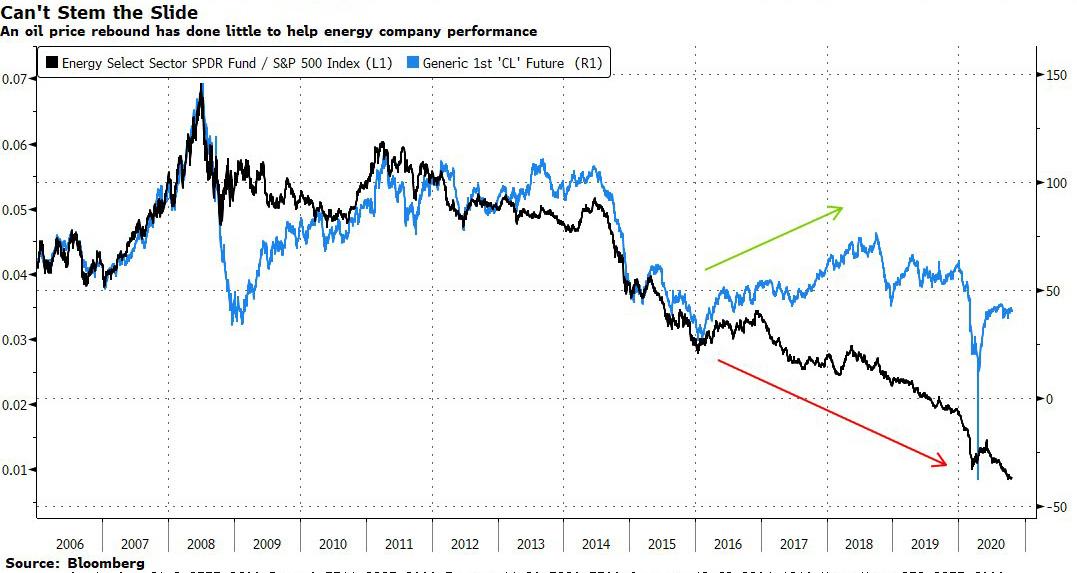US Oil’s Merger Mania Won’t End Well For Energy
Tyler Durden
Wed, 10/28/2020 – 10:06
By Kriti Gupta, commentator for Bloomberg’s Markets Live
The long-awaited shale patch consolidation has arrived, sparking another bout of merger mania in the energy industry. It’s reminiscent of the one in the late 1990s, just as the Internet bubble was exploding. But don’t expect the stocks to rally this time.
Parallels between tech in the 1990s and today are common. But there’s been little mention of what the energy sector went through at the same time and how it suddenly looks so familiar. History’s repeating itself as it appears energy can’t attract investors — again.
Then as now, the backdrop to energy’s M&A boom is a collapse in oil prices. The difference this time, however, is the deals are happening at a quarter of the traditional premiums.
During this pandemic era, four deals have already emerged: Chevron’s takeover of Noble Energy, ConocoPhillips’s acquisition of Concho Resources, Pioneer Natural Resources’s purchase of Parsley Energy and Devon Energy’s merger with WPX Energy. This appears to be just the beginning as rumors circulate of more deals to come.
The economy has structurally changed since 2000, which makes tech’s acceleration look real and lasting. That’s not so for the energy industry, which staged a comeback in the early part of the century as tech dropped. But this time around, the sector faces worsening supply dynamics and a demand hit from which it’s likely to take years to recover.
Supply dynamics were not favorable even before the pandemic. The American shale boom and cheating on OPEC+ production quotas created an oversupplied oil market. Trade risk added to worries for shale producers, which were already treading water.
Since 2017, the pain has become clearer. Oil rallies have seldom spilled over into energy stocks beyond a brief increase in valuations spurred by private equity in 2016.
Add the impact of the U.S. presidential election, and the risks multiply. In the final presidential debate, Democratic challenger Joe Biden advocated for a transition from oil to renewable energy. A potential fracking ban on federal lands, which makes up parts of the crucial Permian basin, presents more danger.
It’s worth noting that China, the second-largest oil consumer behind the U.S., is moving aggressively toward that green energy transition and is establishing itself as a leader in electrification.
Oil prices have largely traded in a range for nearly five months. Seeing so much M&A activity at low premiums tells us that the industry expects stagnation to continue since drastic shifts in crude prices could endanger the deals.
In the short-term, stimulus prospects and a Covid-19 vaccine will likely lift oil prices, accelerate the rotation into cyclicals and perhaps even sustain gains for a while. More deals also are likely, which could boost interest in the sector.
But in the long-term, expect energy to revert back to its multi-year downtrend as investors keep buying growth, consolidation shrinks the industry and the rise of ESG investing weighs on oil stocks
